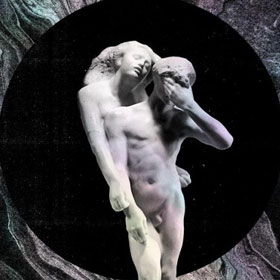Arcade Fire 'Reflektor' Review: A Playful Album Drawing Flawlessly From Different Genres

4.5/5
Arcade Fire’s anticipated fourth studio release, Reflektor, comes on the heels of their unexpected Album of the Year win for The Suburbs at the 2011 Grammys. After their big win, their new creation began sprouting roots. Produced by James Murphy (previously of LCD Soundsystem) the new album refuses to rest on the success of the last. The band taunted and teased fans for weeks prior to release, beginning with trickling the title track slowly through the use of cryptic messages which began popping up around cities, eventually being decoded into messages containing the day of their first singles release (9 p.m. on 9/9/13), a website entitled thereflektors.com and unmarked shows at small venues around their hometown of Montreal, Canada under the assumed named, 'The Reflektors.' And so began the carnival fun house that is Arcade Fire’s new, two-disc compilation, Reflektor.
As demonstrated during their recent surprise performance at the art space 299 Meserole in Bushwick, Brooklyn, where formal attire or costume was required for admittance, Arcade Fire is known for their conceptualization as well as for their talent in musical composition. And an 85-minute, full stream of Reflektor was released on YouTube set to Marcel Camus’ 1959 film Black Orpheus (this has since been taken down). But there is more to the tricks that the band has been toying with in their recent performances and marketing schemes.
Often heavily ponderous in their approach, this new album marks a departure for Arcade Fire into a slightly lighter demeanor; one that is playful, quirky and winks as it spouts its philosophies and references to Greek mythology. This time around, they partake in their own tongue-and-cheek games with their audiences, asking them to be anyone but themselves; be instead a reflection. And the aptly titled Reflektor does just that, becoming a mirror for both fans of the band and of rock music in general. In “Normal Person” Win Butler asks in a stuttering Elvis mockery, “Do you like Rock ‘n Roll music?” and answers “Cuz I don’t know if I do…” Reflektor subtly questions our culture: are we creating or imitating; is it collaboration or innovation? Are we together or alone?
Speaking to Rolling Stone about what inspired the album, and the members of the band as musicians, Regine Chassagne related listening to her neighbors music through her wall and her attempts to then replicate it on her piano. This theme of replication and mimicry is the grounding force of the album. Reflektor took root after a trip to Chassagne’s parents’ home in Haiti, which apparently inspired much of the album’s tones. Another inspiration behind the album, from which the album cover takes its theme, is the Greek myth of Orpheus and Eurydice.
There are plenty of musical references for the musicophiliac in the two discs as well. The first disc serves as a slightly more refined aspect of the band, and disc two encapsulates the rougher, more experimental cogs in their musical machine. Although the band chose not to forefront Chassagne in any of the songs this time around, her voice still stands out as a sharp accompaniment on many of the tracks, such as “Reflektor,” “It’s Never Over (Oh, Orpheus)” and “Joan of Arc.” Chassangne’s voice acts as an eerie echo to Butler’s deeper tones.
Where another band may have made her one of the main lead vocalists on the album per audience demand after her brilliant performance on their last album, Arcade Fire proves once again that they are in it for the music and not so much for the fame by having Chassagne take a backseat.
Throughout the album, Arcade Fire brings a vibrant energy to the tracks, reminiscent of their live performances, filled with static airwave noises and muttered and broken introductions. There is a remarkable presence to the sound and daring imperfections that scatter themselves among the poetic lyrics in songs like “Normal Person” and “Here Comes The Night Time.”
So, for anyone questioning how well Arcade Fire can handle the momentous success that has just confronted them, this album is a testament to their ability to create music that stays true to their past while still propelling their growth as musicians. Funneled through various musical genres, bands and inspirations, Arcade Fire has put forth an album that speaks not only to the musicianship that has come before, but also to their own era, generation, and their role within music history.
Get Uinterview's FREE iPhone App For Daily News Updates here.
Get the FREE Uinterview iPad app here and watch our videos anywhere.
RELATED ARTICLES
Get the most-revealing celebrity conversations with the uInterview podcast!





Leave a comment